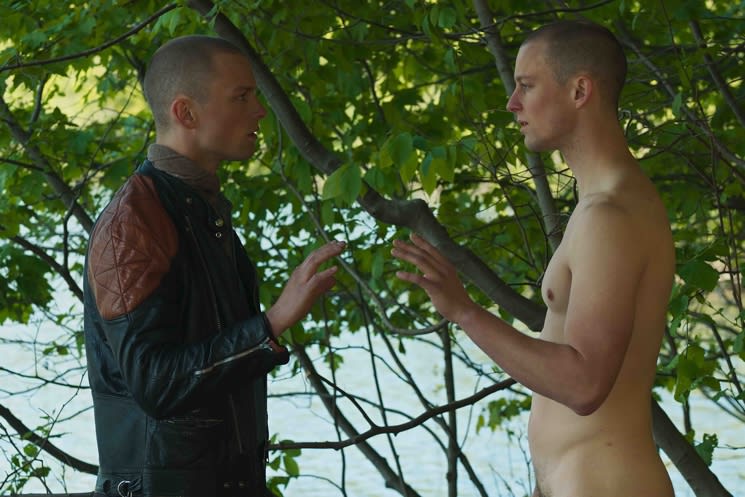Canadian director Bruce LaBruce has earned something of a reputation. He creates films that go heavy on unconventional sexual practices and other taboo subjects, and Saint-Narcisse is no different. The film explores narcissism through the lens of religious idolatry — and, of course, incest.
Dominic (Felix-Antoine Duval) is a 20-something living in Quebec in 1972 who provides care for his grandmother (Angele Coutu). He has a seemingly odd proclivity towards taking pictures of himself with a Polaroid camera as he goes about his life. He discovers that his mother (Tania Kontoyanni), whom he had long thought to be dead, is alive; following the passing of his grandmother, he sets out to find her. In doing so, Dominic unravels a web of family secrets, including having a twin brother Daniel (also played by Duval) and sister (Alexandra Petrachuk).
Dominic finds Daniel living as a monk in a monastery, victimized by a perverse priest who believes Daniel to be the reincarnation of Saint Sebastian. When Dominic and Daniel finally meet, they are overcome with lust and love for one another and begin a sexual relationship. After establishing their bond, Dominic takes it upon himself to free Daniel from the clutches of the priest and monastery.
Saint-Narcisse, as the title suggests, explores narcissism, with LaBruce drawing connections between the ancient Greek myth of Narcissus and the 1970s — and, by way of this film, to 2021. It suggests that self-obsession is as old as humanity, and we as humans are bound to fall into its trappings.
LaBruce seems to embrace the idea of Saint-Narcisse as a satirical B-movie, but without the usual self-awareness that comes with this type of film. In doing so, Saint-Narcisse is confident insofar as it goes apologetically all-in. This is helped greatly by a strong performance from Duval, who tackles the dual role with vulnerability and assuredness.
While the film grabs your attention in the first frame with a voyeuristic laundromat encounter, it becomes slightly muddled in the back half. One too many plots and themes attempt to resolve themselves, dampening their impact. That being said, LaBruce successfully allows his claustrophobic film to breathe, especially during the scenes in the monastery. The '70s aesthetic isn't played with obvious references but is subtle, providing Saint-Narcisse with an authentic world even when the events become surreal.
LaBruce is a niche filmmaker with devoted followers who should enjoy Saint-Narcisse. And there will be many who will walk away thinking, "What did I just watch?" For the uninitiated, it's worth giving LaBruce a shot. A wholly unique filmmaker presenting ideas not commonly seen on screen, for better and for worse.
(Northern Banner Releasing)Dominic (Felix-Antoine Duval) is a 20-something living in Quebec in 1972 who provides care for his grandmother (Angele Coutu). He has a seemingly odd proclivity towards taking pictures of himself with a Polaroid camera as he goes about his life. He discovers that his mother (Tania Kontoyanni), whom he had long thought to be dead, is alive; following the passing of his grandmother, he sets out to find her. In doing so, Dominic unravels a web of family secrets, including having a twin brother Daniel (also played by Duval) and sister (Alexandra Petrachuk).
Dominic finds Daniel living as a monk in a monastery, victimized by a perverse priest who believes Daniel to be the reincarnation of Saint Sebastian. When Dominic and Daniel finally meet, they are overcome with lust and love for one another and begin a sexual relationship. After establishing their bond, Dominic takes it upon himself to free Daniel from the clutches of the priest and monastery.
Saint-Narcisse, as the title suggests, explores narcissism, with LaBruce drawing connections between the ancient Greek myth of Narcissus and the 1970s — and, by way of this film, to 2021. It suggests that self-obsession is as old as humanity, and we as humans are bound to fall into its trappings.
LaBruce seems to embrace the idea of Saint-Narcisse as a satirical B-movie, but without the usual self-awareness that comes with this type of film. In doing so, Saint-Narcisse is confident insofar as it goes apologetically all-in. This is helped greatly by a strong performance from Duval, who tackles the dual role with vulnerability and assuredness.
While the film grabs your attention in the first frame with a voyeuristic laundromat encounter, it becomes slightly muddled in the back half. One too many plots and themes attempt to resolve themselves, dampening their impact. That being said, LaBruce successfully allows his claustrophobic film to breathe, especially during the scenes in the monastery. The '70s aesthetic isn't played with obvious references but is subtle, providing Saint-Narcisse with an authentic world even when the events become surreal.
LaBruce is a niche filmmaker with devoted followers who should enjoy Saint-Narcisse. And there will be many who will walk away thinking, "What did I just watch?" For the uninitiated, it's worth giving LaBruce a shot. A wholly unique filmmaker presenting ideas not commonly seen on screen, for better and for worse.
